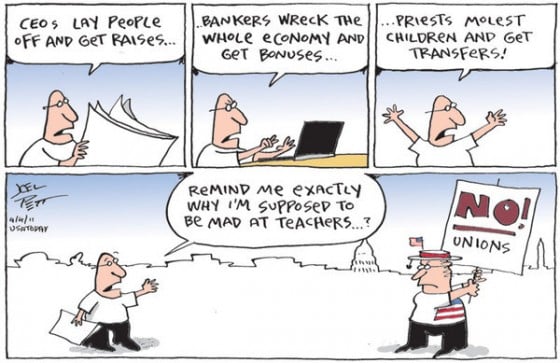Parents say more than ‘no’
“The Party of No? It has to be said” (Letters, April 2), comparing Republicans to parents who must sometimes say “no” to their children, needs clarification.
Consider what the Republican parents are saying “no” to – education, health care, supporting benefits for poor families – while saying “yes” to purchases of luxury items by wealthier members of society.
These are not the actions of responsible, caring parents.
Peter Rogers, Pleasant Hill
…
Fleeced by unions
The California GOP deserves praise for blocking typical Democratic answers to budget problems: more taxes.
Why is it so difficult for the millions of nonunion California taxpayers to understand they are getting fleeced by the public employee unions who refuse to allow the mere mention of “pension reform” into the discussion?
Why do the many articles and letters about this budget impasse conveniently avoid addressing the real problem or simply give it passing mention?
The budget problem is not going away until public employee unions face reality and stop living lavishly on the backs of the vastly greater majority of nonunion, hardworking California taxpayers.
Karl Spurzem, Corte Madera [a very Upper-middle class community]
Union workers live lavishly?
Re: “Fleeced by unions” (Letters, April 2).
I am not a California public employee, but “living lavishly”? Really? Implying that union employees are frolicking in mansions at the expense of other California workers is ridiculous.
Kristen Ross, El Cerrito
Goldman Sachs rewards top execs with cash bonuses
Christine Harper, Bloomberg News
Tuesday, April 5, 2011
Goldman Sachs Group Inc. Chairman and Chief Executive Officer Lloyd C. Blankfein’s $19 million compensation for 2010, almost double the prior year, ended two years in which the firm’s top executives gave up cash bonuses.
Blankfein’s pay included $5.4 million in cash, $12.6 million in restricted stock, a $600,000 salary and about $464,000 in other benefits, a proxy statement from the New York firm showed. Blankfein’s $9.8 million pay for 2009 included $9 million in restricted stock plus salary and other compensation.
Cash awards are back at Goldman Sachs, the fifth-biggest U.S. bank by assets, after a 38 percent drop in annual earnings and a year in which the stock price ended close to where it began. While pay is up from 2008, when Blankfein, 56, and six other senior officers got no bonuses, it remains below Blankfein’s record-setting $67.9 million award for 2007.
“The fact that they would return to a more market-based pay is probably not surprising” after 2008 and 2009, said Rose Marie Orens, a senior partner at Compensation Advisory Partners LLC in New York. “They’re not quite back to anything remotely like what they paid in the prior years.”
Goldman Sachs’s 2010 share performance – a decline of less than half of 1 percent – outstripped competitors including Bank of America Corp. and Morgan Stanley, which was the second-biggest U.S. securities firm after Goldman Sachs before both converted to banks in 2008. Shares of JPMorgan Chase & Co., which reported a record profit last year, rose 1.8 percent during the year.
“While our performance in 2010 was not as strong as in 2009 due to difficult market conditions for much of the year, we continued to create value for our shareholders and prudently manage our firm from a risk perspective,” Goldman Sachs said in the proxy.
All 30 members of the management committee received only restricted stock for their 2009 bonuses and four of them – Chief Financial Officer David A. Viniar, 55; President and Chief Operating Officer Gary D. Cohn, 50; and Vice Chairmen J. Michael Evans, 53, and John S. Weinberg, 54 – received the same $9 million award as Blankfein.
For 2010, Goldman Sachs once again matched those four executives’ bonuses to Blankfein’s $12.6 million in restricted stock and $5.4 million in cash. All four also received a $600,000 salary in 2010.
“They’ve had a history of paying their top five like partners,” Orens said. “It’s unusual, but it really comes from their partnership mentality.”
The firm disclosed in January that Blankfein’s salary will increase to $2 million in 2011 and that Cohn, Viniar, Evans and Weinberg will each receive a $1.85 million salary starting this year. Each of them had received a $600,000 salary since 1999, the year the firm became a public company.
Blankfein and eight deputies reaped a total of $125 million during 2010 from their investments in private equity and hedge funds managed by the firm, the proxy disclosed. Blankfein’s payments, which included profits and any return of capital, totaled $27.2 million, outstripping his compensation.
http://sfgate.com/cgi-bin/article.cgi?f=/c/a/2011/04/05/BU381IPOET.DTL

Chevron approves raises for top execs
Chevron Corp. said Monday its board of directors has approved pay increases for the company’s top executives.
Chairman and CEO John Watson received a $100,000 raise, bringing his base salary to $1.6 million. The board also agreed to boost performance-based incentive awards for Watson.
Chief Financial Officer Pat Yarrington was given a $60,000 raise to bring her base salary to $860,000 and George Kirkland, Chevron’s vice chairman and executive vice president, received an increase of $100,000 to bring his base salary to $1.3 million.



🙁